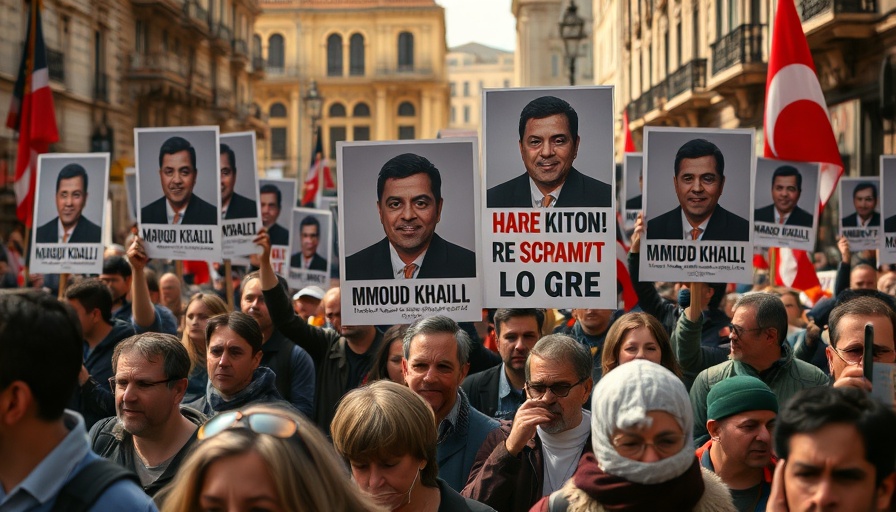
Mahmoud Khalil’s Release: A Win for Justice?
The recent release of Mahmoud Khalil, a Columbia University graduate and pro-Palestinian activist, from federal custody has sparked debates about immigration policy and free speech in America. After being detained for over three months, Khalil was freed following a federal judge's ruling that his continued detention lacked sufficient evidence.
On Friday, Judge Michael Farbiarz highlighted the federal government’s failure to demonstrate that Khalil was a flight risk or a danger to the community. His statement underscores the ongoing tensions surrounding immigration enforcement, especially in cases involving political activism. “No one is illegal—no human is illegal,” Khalil declared upon his release, reflecting the broader implications of his situation on immigrant rights and freedom of expression.
Context of the Detention: Political Activism or National Security Threat?
Khalil’s arrest by federal agents on March 8 drew immediate backlash. It reportedly occurred in front of his pregnant wife, Noor Abdalla. This dramatic moment was not just another immigration case; it highlighted fears that the Trump administration was weaponizing immigration laws against dissenters. Khalil was accused of leading activities aligned with Hamas, a charge his supporters vehemently dispute, arguing that his activism should be protected under the First Amendment.
The accusations against him may not merely stem from his actions but from his vocal stance on Palestinian rights, raising questions about the government's approach to political dissent. Securing Khalil's release painted a picture where the judiciary stood as a bulwark against executive overreach, suggesting that the legal system may uphold the values enshrined in the Constitution amidst a climate of fear and repression.
Emotional Reactions: A Family’s Longing
Khalil’s release proved to be a moment of exuberance for his family. Noor Abdalla expressed her relief, stating, “After more than three months we can finally breathe a sigh of relief and know that Mahmoud is on his way home to me and Deen, who never should have been separated from his father.” This emotional outcry presents a more human side to the legal battle, emphasizing the personal toll of such detentions.
The family’s relief also resonates with broader immigrant communities, many of whom fear the repercussions of legal actions taken against individuals for their beliefs. As Khalil prepares to reunite with his wife and child, it underscores a pivotal moment where justice, albeit temporarily, has triumphed over bureaucratic struggles.
Implications for Immigration Policy: Shifting Narratives
Khalil’s case resonates with a wave of advocacy for more humane immigration policies in America. His temporary detention serves as an example of how political rhetoric can influence immigration enforcement and the extent to which personal freedoms might be curtailed under the guise of national security.
In recent years, activists have raised alarm bells about the increasing power of immigration authorities under the previous administration. Khalil's eventual release could inspire a growing movement among activists, pushing for comprehensive immigration reform that prioritizes human rights over punitive measures.
A Shining Light on Free Speech
This incident not only concerns immigration policy but also highlights the significant implications for free speech in America. By challenging the federal government's claims against him, Khalil and his supporters advocate for the protection of individuals who express controversial beliefs. His assertion that his activism was a targeted response to political expression points to a critical conversation about the balance between national security and civil liberties.
The First Amendment serves as a protective shield for activists across the country. Khalil’s struggle shows the vital importance of safeguarding these rights, especially as society grapples with issues of dissent and protest.
Future Trends in Immigration Activism
As the landscape of activism continues to evolve, Khalil’s case stands as a critical study in the use of technology and social media to mobilize support. The rapid dissemination of information regarding his detention fueled public protests and drove attention to his plight, reflecting how online activism can intersect with traditional forms of resistance.
Looking ahead, we may witness an increase in digitally-driven movements that challenge systemic injustices and demand accountability. Khalil’s journey also signifies the resilience of communities advocating for change, showcasing their ability to leverage modern technology in the struggle for justice.
As individuals and families await immigration policies that prioritize compassion and transparency, Khalil's story embodies hope that justice—not just for him, but for all affected by the immigration system—can prevail.
 Add Row
Add Row  Add
Add 




Write A Comment